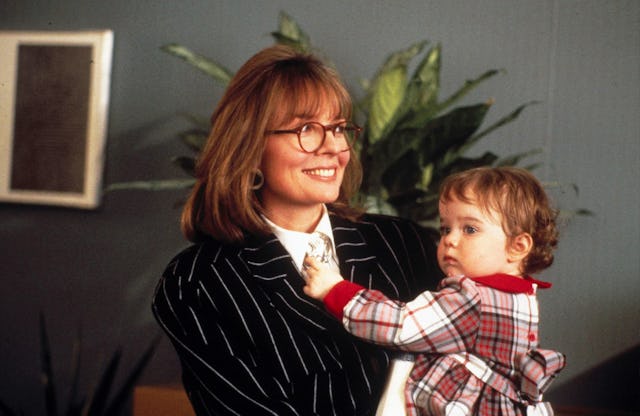I Rewatched Baby Boom As A Mom, & Wow, I Get It Now
I actually think this movie proves women can have it all — when we realize our “all” is different than we originally thought.

I’ve never been a super Type A kind of person. I’ve never mapped out things or made plans for specific parts of my life — I’ve just always had a general idea of what I wanted and my goals, and I just figured eventually I’d find my way there. In 1987’s Baby Boom, Diane Keaton is the Type A kind of person who maps out her entire life, leaving zero room for error... until a baby ends up in her life. The classic movie is one full of funny, real-life moments and lots of late ’80s nostalgia, but its commentary on how society treats working mothers — and just ambitious mothers, in general — is still relevant. I loved this movie so much as a kid, and I thought when I rewatched it as a mom, that’s all I would see: how little progress we’ve made since 1987 when it comes to how moms are treated.
But, surprisingly, the thing I realized the most when rewatching Baby Boom as a mom is that Keaton’s character, J.C. Wiatt, actually could have it all. That all of us moms can have it all — when we change up what our “all” is.
If it’s been a while since you watched Baby Boom, here’s a quick little recap. Keaton plays J.C. Wiatt, a super successful management consultant in Manhattan, who unexpectedly inherits her cousin’s 14-month-old baby after her cousin’s death. She is fully prepared to place the baby, Elizabeth, for adoption but decides to keep her instead, thus unraveling her entire life. J.C. loses her big promotion at work and has her own little breakdown of sorts before finding success in a homemade baby food company and raising Elizabeth. It’s a rom-com — she ends up with the vet in the small town she’s moved to after quitting her high-powered job — but it’s the sweet moments of motherhood, and J.C. realizing that maybe she does have it all, right here in her arms, that got me the most.
Of course, the big part of the story is supposed to be that she doesn’t get the promotion because she’s too focused on Elizabeth. And, humiliated by this, she refuses to take on smaller clients and just quits altogether. We’re meant to see how this baby has upended her life, the movie ending with her in a better and happier place than she ever would have been.
And as simple as it sounds, that’s what has stuck with me since rewatching Baby Boom. Motherhood changes people; we know this. But whereas many may suggest that motherhood makes working more difficult or success harder to find or love tougher to hold onto, Baby Boom makes a case for motherhood just making everything different. It doesn’t make our lives worse or harder — it means we have to shift our mindset, rethink our priorities, and realize that we can have it all as a mom. We just each have to individually figure out what our all means.
For J.C., that means doing a job she loves — Country Baby — while spending time with Elizabeth. It doesn’t mean she can’t have it all because she can’t be the mom she wants to be to Elizabeth and be the boss she wanted to be in NYC. She has it all because she’s happy, even if she has completely veered away from her original plans.
Baby Boom isn’t meant to be a blueprint for all moms. Starting your own business is hard and finding love is tough and fixing up an ancient house is stressful. But Baby Boom reminds all of us that our journeys through motherhood are not at the hands of other people. We get to decide if we can have it all. We get to decide what we want our lives to look like. And we get to decide which path to take when — naturally — the roads veer sharply from the map we had in our hands.
Baby Boom gets it. And watching it now as a mom of three, I do, too.